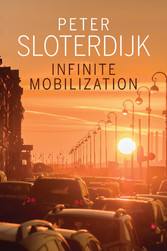
Infinite Mobilization
von: Peter Sloterdijk
Polity, 2020
ISBN: 9781509518517
Sprache: Englisch
240 Seiten, Download: 355 KB
Format: EPUB, auch als Online-Lesen
1
THE MODERN AGE AS MOBILIZATION
May your fate be to live in interesting times.
Ancient Chinese curse
Can humans still comprehend the general development of the modern world that they have set in motion? A growing list of contemporaries denies that it is possible – their answers are based on arguments and not just instinctual reactions. For this reason, there is much talk of a post-modern condition at the end of this interesting century.1 But the inscrutable aspects of our times are so uniquely new that we must not equate our current confusions of the mind with pre-modern surrenders of human reason when confronted with the mysteries of the world.
One idea has rooted itself in pre-modern ways of thinking more deeply than any other: nothing turns out the way it was planned. For even though man may propose, it is still the gods who dispose, whatever the case may be. The a priori of any Old World practical life experience is: if it happens as it should, it happens differently than it was planned. This experience cannot rid itself of the constant awareness that human plans and actions always move in the recesses of an insurmountable passivity. But with the advent of modernity, things happen in a new way – just as humans have planned. They do so because people in the West, monks, merchants, physicians, architects, painters, and cannon-makers – in summa geniuses and engineers – have begun to organize their way of thinking in an entirely new way; and (one would like to say, suddenly) a new kind of “praxis” joins this reorganization of thought as the technological counterpart of thinking and intervenes in the events of the world with a revolutionary impact. Modernity as a techno-political composite has unhinged the old familiar equilibrium between human power and powerlessness. Spurred on by a history-making amalgam of aggression and optimism, modernity promises us a world in which things turn out as planned because people are able to accomplish what they want – and if not, they are able and willing to learn. In modern times, it is the will to power of the can-do spirit that makes the world go around.
It is for one reason only that we call our epoch modern: people of the West have been so captivated and impressed by their own great deeds that they found the courage to proclaim that they had created the world on their own. This and nothing else constitutes the very core of what we (often defensively) refer to as the project of modernity. This project nature of the modern era stems from the grand assumption that we will soon be able to control the world to such an extent that nothing continues to develop unless we wisely choose to maintain it with our own actions. The modern project is thus established on the basis of a kinetic utopia – something that has never been explicitly articulated: the total movement of the world is to be the implementation of our plans for it. The movements of our day-to-day lives become progressively identical with the movement of the world itself; the process of the world as a whole increasingly resembles an expression of our lives – things occur as planned because that which occurs is increasingly an event of our making. It would not suffice to say that modernity set out to make history from this point forward. At its innermost core, modernity wants to create nature in addition to history. As this evil century draws to a close, it dawns on us that making history was just a pretext. The crucial issue of the modern era is the nature that is to be made.
As soon as modernity’s kinetic utopia is revealed, its seemingly stable foundation cracks open and new problems come to light – what we have learned in the good old modern age no longer applies to anything. The paradoxes displayed by the very developments of the modern era constitute the thus newly formed and unusual problem world: a post-history superimposes itself onto history, an epinature onto nature, and a post-modernity onto modernity. Meanwhile, the inevitable transformation of modernity into post-modernity becomes obvious to any onlooker. It results from the observation that even modern events occur differently than planned – but not because man proposes and god disposes; rather, this notion that “it must occur differently” is both inherent in and not quite understood by our thoughts and actions, and it pushes right through our venture with an unstoppable irony. Things do not happen according to plan because we have left movement out of the calculation. Things unfailingly do not happen according to plan because as we think through and bring forth what is supposed to occur, we automatically set in motion something else as a by-product – something we did not think about, did not want, and failed to consider. Once set in motion, it propels itself forward with a dangerous tenacity. It seems that we have surrounded ourselves with an epinature of consequences that slip away from the grasp of our “history-making” praxis like a secondary physis. With mounting unease, we watch as the self-perpetuating side-effects of modern progress spill over into the controlled projects; a fatally foreign movement breaks off from this very core of the modern enterprise, from within the consciousness of a spontaneous independence that is guided by reason – and it slips away from us in every direction. What looked like a controlled uprising towards freedom turns out to be a slide into an uncontrollable and catastrophic hetero-mobility. Precisely because so much comes about through our actions, just as we have planned, developments as a whole turn out explosively and affect us quite differently.
This is the post-modern status quo, and it is actually a lapsus – a regressive step. A philosophical post-modernism made up of insights and not merely nostalgic posturing or bad moods can only be possible today because, given the actual course of events, powerful arguments make it clear that the bubble of modernity’s kinetic utopia has burst. Unforeseen processes have gained momentum, and it is doubtful whether humans can ever rein them back in and divert them to a trajectory that will not prove fatal.
If we were to give a philosophical name to the drift of the current “civilizing process” (a dreadful term that burns the tongue), we would have to say that it resembles a thinking avalanche. What is a thinking avalanche? We do not know, but it is certainly what we are. We were hardly predictable as such, but this astounding avalanche is nevertheless plunging towards the valley as we speak. The “civilizing process” (the tongue begins to ache) turns out to be a pressing ontological oddity. What becomes a given in this process is nothing other than a self-reflexive natural catastrophe. And like all that is calamitous, this, too, is philosophically very interesting. The thinking avalanche is the industrial post-Christian counterpart to Pascal’s thinking reed, which once upon a time trembled in the icy breath of the early modern era. Meanwhile, the most fragile of all creatures, the human, avalanche qui pense, is no longer endangered by the storm of life alone – he is himself setting off the landslides that can bury him alive.
Leaving these rather lyrical intimations behind, we will now turn to the analytical and feel our way forward through the no-man’s-land between old concepts and new circumstances. Now more than ever, a critique of the current times must begin with the admission that we do not know how things happen to us. We will begin by seeking that which is incomprehensible, unwritten, and overlooked in the current “civilizing process.” At this point, it might only be possible to establish a few bridgeheads of articulation in the blind and murky vortex of events. I do not go so far as to claim that an alternative “critical theory” of the modern age could already take shape in these pages. What I do claim is merely this: first, that both of the well-known versions of critical theory (the Marxist and Frankfurt Schools primarily come to mind) have up to now remained irrelevant because either they do not grasp their object – the kinetic reality of modernity as mobilization – or they are unable to point out a critical difference to it because they are mobilizers themselves based on the effect they have; second, that diagnoses of present times must be brought into a kinetic and kinesthetic dimension because if they are not, all talk of modernity bypasses what is most real. The following diagnostic exercises are post-modern only insofar as they stem from a readiness to formulate the modern active voice into the passive voice. To think from a post-modern position is to explicitly own up to the congestion, vortices, vacuities, and depressions that come with the kind of spontaneity that the modern era has triggered. With respect to philosophy, the post-modern can perhaps best be recognized by its reformulation of modernity’s strong and proud sentences in the active voice into those in either passive or impersonal phrases. What is thereby revealed is not only a grammatical engagement but also an ontological one – what is at stake is nothing less than the possibility to include suffering, incidents, and processes in our contemporary idea of “being” alongside deeds, dates, and productions. Modernity has overfed us with theories of action – what it knew of suffering is only that it could be “used” as an engine for actions. But what if the necessity to develop a passionate...










